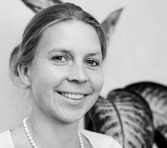 Home
Actueel
Visie
De 7 fasen
De Esoterische Evolutie
Boeken
Artikelen
Verwante teksten
Tegenkrachten
Over Margarete
Quotes / Test
Links / contact
Home
Actueel
Visie
De 7 fasen
De Esoterische Evolutie
Boeken
Artikelen
Verwante teksten
Tegenkrachten
Over Margarete
Quotes / Test
Links / contact
|
TranshumanismThe End of Humanity? The challenges of transhumanist visions of the future
Ariane Eichenberg (Dr.phil.) and Christiane Haid (Dr.phil.)The thought of forming oneself according to one's own ideal is central to transhumanists. They consider human beings to be imperfect and flawed and in need of improvement and development through technology. The option of being born again for divine and higher purposes is not necessarily a problem for the transhumanist concept, if one sees this state as a transition to an artificial super intelligence, unrelated to any divine powers or cosmic developments. Targeted genetic, neurotechnological, prosthetic and pharmacological interventions are meant to optimize our bodies, feelings and mind (brain) and broaden them so that biologically programmed human limitations, sickness, ageing and death can be overcome and ultimately left behind. The name ‘transhumanism' reveals its central programme: transcending human limitations at all levels through technology. The sacred history of technologyRay Kurzweil, head engineer at Google, is one of the pioneers of this movement which emerged in the 1980s and has become influential in science, economy and politics. In his book The Singularity is Near. When Humans Transcend Biology (New York 2005) Kurzweil describes the stages of this transition. He divides evolution into six epochs. The fifth epoch begins in 2030 and is marked by the merging of human beings and machines. It is the beginning of the singularity; for Kurzweil a time when exponential growth explodes, when the human-technical creative power will grow immeasurably, when the boundaries of mind and body will be overcome and technology will have acquired a kind of consciousness. ‘Once we saturate the matter and energy in the universe with intelligence, it will ‘wake up', be conscious and sublimely intelligent' (p. 375). This is the sixth epoch of evolution which, Kurzweil concludes, will come ‘quite close to God'. Life as a computing operationRay Kurzweil's book is a great sacred history of a technology that aims, he says, at placing the universe into the hands of humanity. This not only reveals the whole hubris behind these ideas, it also lacks logic because how can human beings hold anything in their hands when they no longer exist as such. The whole gigantic scenario is supported by scientists, entrepreneurs and governments all over the world. Not only in the US, but in China, India and Europe, too, incredible sums of money are being invested in research projects. Transhumanism has also fully arrived in politics and religion. In 2014, Zoltan Istvan founded a Transhumanist Party in the United States, Germany has its Transhumane Partei Deutschlands (tpd); in 2015 Anthony Levandowski founded the religious organization Way of the Future, which wants to create a deity based on Artificial Intelligence. As early as a hundred years ago, Rudolf Steiner outlined this development when he described that certain forces, Ahrimanic beings, were aiming at a new earth evolution and at awakening in human beings an interest in ‘everything mechanical and machine-like'. Their aspiration is to let the animal, plant and human world disappear, to have ‘human beings taken away from the earth', and to create a ‘world with nothing but machines'. 1) Cut off from cosmic evolutionRudolf Steiner explanations reveal why spirituality and transcendence are part of the transhumanist model of the world and why the yearning for them will continue, even in such a distorted and perverted form. It is important to understand transhumanism and its consequences. Once age, sickness and death are no longer necessary conditions of development, the ‘I' will be put into a state of permanent consciousness. Human beings will be cut off from the natural cosmic rhythms of day and night. In his Anthroposophical Leading Thoughts (GA 26) Rudolf Steiner points out, however, that cosmic evolution is dependent on human beings living on earth in freedom. Socially, the technological developments mean isolation and a focusing on one's own apparent self. Only in the encounter with the other human being can the ‘I' find itself and become a chalice for something higher. The machines to which all thinking, remembering, even feeling and doing are being transferred will not only cause us to become alienated from ourselves and separated from our fellow humans, but also released from any responsibility. We will be unfree puppets of machines. Dr. Ariane Eichenberg lectures at the Universities of Hamburg and Stuttgart, Germany. Dr. Christiane Haid is director of the Humanities Section and the Goetheanum Press in Dornach, Switzerland. 1) Rudolf Steiner: The Responsibility of Man for World Evolution through his Spiritual Connection with the Planet Earth and the World of the Stars, GA 203, Lecture 11th March l921. More lectures on this subject on 29th ,30th January, and 13th March l921. Available in English via https://www.rsarchive.org This article was taken from Anthroposophy Worldwide, 9/18. © Margarete van den Brink 2007-2025 - www.margaretevandenbrink.nl
|



 Ariane Eichenberg
Ariane Eichenberg Christiane Haid
Christiane Haid


